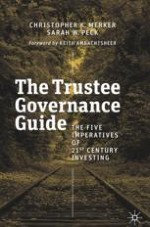2019 | OriginalPaper | Buchkapitel
5. Human Error and Behavioral Finance
verfasst von : Christopher K. Merker, Sarah W. Peck
Erschienen in: The Trustee Governance Guide
Aktivieren Sie unsere intelligente Suche, um passende Fachinhalte oder Patente zu finden.
Wählen Sie Textabschnitte aus um mit Künstlicher Intelligenz passenden Patente zu finden. powered by
Markieren Sie Textabschnitte, um KI-gestützt weitere passende Inhalte zu finden. powered by
